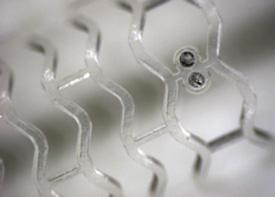
October 30, 2012 — Elixir Medical Corp. said enrollment is complete in its 120-patient, pivotal clinical trial evaluating the safety and efficacy of the DESolve Novolimus-Eluting Bioresorbable Coronary Scaffold System. The scaffold is designed to resorb in the body within one to two years after implantation and return the patients’ coronary vessel to de novo state. Patient follow-ups are expected to be completed by year-end.
The primary safety endpoint of the DESolve Nx trial is the composite of major adverse cardiac events (MACE) comprising cardiac death, target vessel myocardial infarction (MI) and clinically-indicated target vessel revascularization (TLR). The primary angiographic endpoint of the trial is in-stent late lumen loss at six months as assessed by QCA (quantitative coronary angiography). In a subset of patients, additional QCA assessment will be conducted at 24 months; stent and vessel assessment using IVUS (intravascular ultrasound), OCT (optical coherent tomography) will be conducted at baseline, six and 24 months; and MSCT (multi-slice computed tomography) at 12 months, thus providing long-term assessment of the scaffold and surrounding vessel.
“Bioresorbable drug-eluting scaffolds that effectively treat the coronary artery obstruction without leaving a permanent metallic implant behind in the long term are undoubtedly the next frontier for interventional cardiology,” said Stefan Verheye, M.D., Ph.D., ZNA Middleheim Hospital, Antwerp, Belgium, and principal investigator of the DESolve Nx study. “Having used the DESolve bioresorbable scaffold system in two clinical studies, and observed its impressive performance, I am confident that Elixir’s DESolve scaffold system can achieve and maintain excellent long-term clinical outcomes.”
The DESolve scaffold made from a proprietary and proven poly-L lactide (PLLA)-based polymer provides optimal strength and support to the artery while delivering the novel anti-proliferative drug, Novolimus. Some unique features of the DESolve scaffold design as demonstrated in preclinical testing include: the ability to self-appose to the vessel wall in cases of malapposition; the ability to maintain radial strength and vessel support for the critical period of vessel healing while bioresorbing within 12 to 24 months; and a wide margin of scaffold expansion without strut fracture.
The multicenter, prospective DESolve Nx trial was designed to enroll 120 patients at 15 centers in Germany, Belgium, Poland, Brazil and New Zealand. Enrollment completion of this DESolve Nx trial follows outstanding results of Elixir’s DESolve first-in-man study wherein at six months, Elixir’s DESolve demonstrated excellent late lumen loss of 0.19 ± 0.19 mm, no artery blockage (0.0 percent binary restenosis), no late malapposition (0.0 percent), low acute recoil (6.4 percent ± 4.3), no cases of blood clots (0.0 percent stent thrombosis) and a single MACE event due to a stenosis in the segment 5 mm proximal to the scaffold, which itself was widely patent.
Successful Live Case Follow-Up of DESolve Nx Patient at TCT 2012 in Miami
Professor Alexandre Abizaid, M.D., Ph.D., The Instituto Dante Pazzanese de Cardiologia, Brazil, conducted a successful live case from Sao Paulo of a patient enrolled in the DESolve Nx trial undergoing six-month follow-up. The angiographic, IVUS, OCT, and MSCT imaging of the coronary vessels treated with the fully bioresorbable DESolve Novolimus-Eluting Coronary Scaffold was projected live in the main arena at the 24th annual Transcatheter Therapeutics (TCT) conference. The coronary vessels of the patient were widely patent, and these excellent results were well received by an expert panel of cardiologists gathered in Miami.
Bioresorbable scaffold technology had thus far been a challenge in the industry because it required a level of strength and support that only permanent metallic stents had been able to provide, the safe and gradual bioresorption of the scaffold once the blood vessel healed, and excellent clinical outcomes. The bioresorbable DESolve Novolimus-Eluting Coronary Scaffold holds the promise to overcome these challenges.
One-Year Results from DESolve I First-In-Man Study for Fully Bioresorbable Drug Eluting Coronary Scaffold System
Elixir Medical also announced one-year MSCT results at the “Next-Generation DES and Bioabsorbable Scaffolds” session at TCT for the 15-patient first-in-man clinical study of the fully bioresorbable DESolve coronary scaffold system, which were presented by Stefan Verheye, M.D., Ph.D., principal investigator of the study.
MSCT is a powerful noninvasive diagnostic modality to visualize coronary arteries and the manifestations of coronary disease. At one year, coronary vessels treated with Elixir’s DESolve maintained their mean minimum lumen diameter (MLD) at 2.4 ± 0.4 mm, with a percent diameter stenosis (percent DS) of 15.9 ± 10 percent as measured by MSCT. These results confirm the sustained efficacy of Elixir’s DESolve, which had demonstrated excellent results at the six-month angiographic follow-up with a mean MLD of 2.41 ± 0.28 mm and percent DS of 12.63 ± 11.37 percent.
“The DESolve bioresorbable scaffold system for the treatment of artery disease will become the new standard for vascular intervention,” said Motasim Sirhan, CEO of Elixir Medical.
Elixir said at TCT that it plans to start a U.S. Food and Drug Administration (FDA) investigational device exemption (IDE) trial in the United States after the stent is approved for use in Europe. The company is already in preliminary discussions with the FDA.
For more information: www.elixirmedical.com


 January 05, 2026
January 05, 2026 









